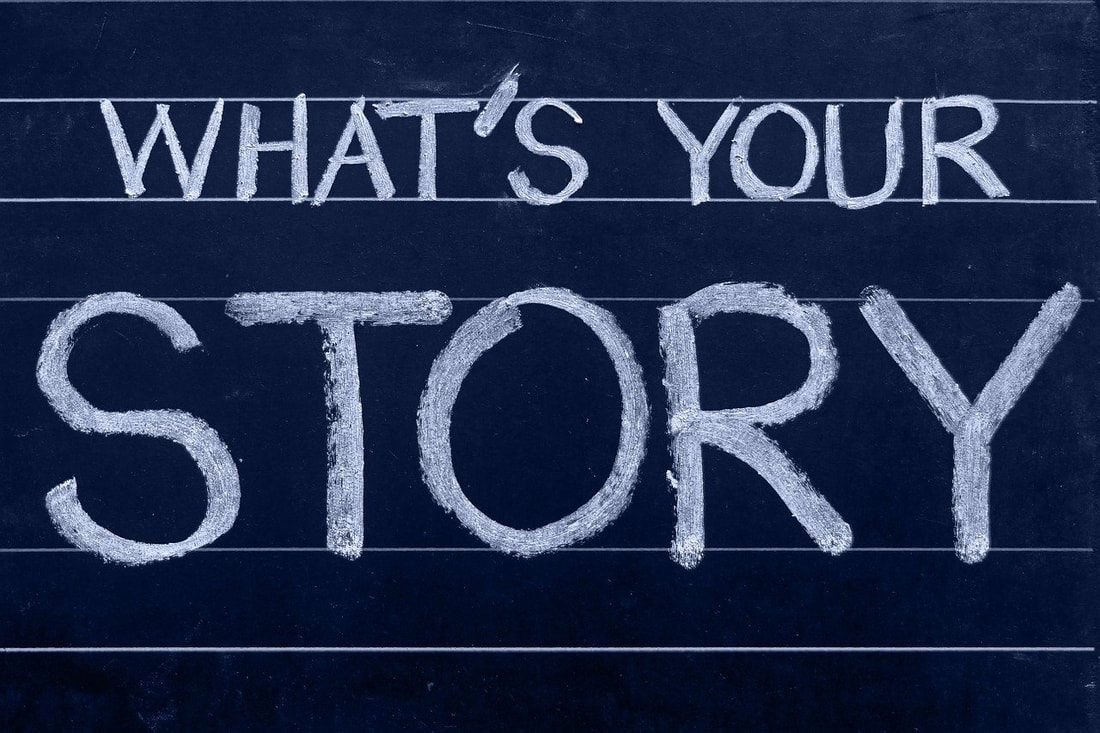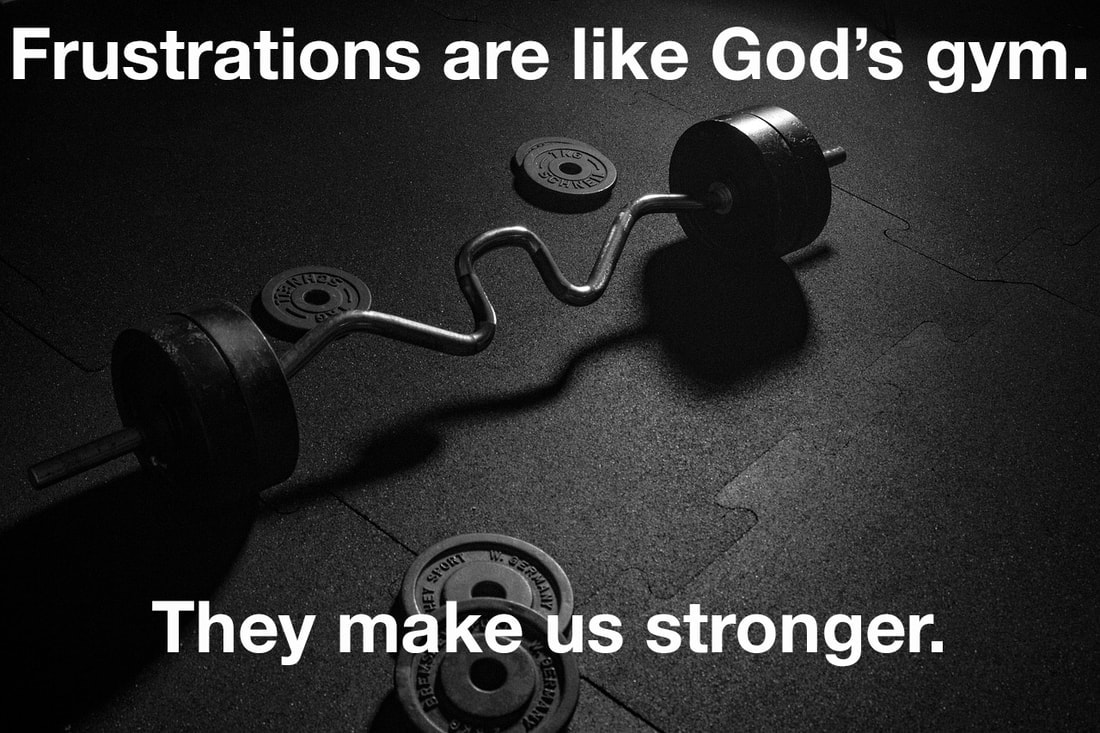9 Ways to Battle Frustration8/17/2023 I have often said that God took me to Africa for 11 years because He needed to teach me patience. I’m sure this wasn’t the only reason, but it was one of the biggest things He did in me. Missions provides ample opportunities for frustration: redundant visa paperwork, laws that randomly change, gridlock traffic, confusing cultural customs, shopping at 5 stores for basic groceries, endless lines, nothing working, etc. It is easy to begin to think that if life was easier then I wouldn’t get impatient, frustrated or angry. When this happens I begin to long for comfort and lack of problems. But in all of my frustrations, the events aren’t the real problem. The events are simply God’s tool to reveal my heart. Like fire placed under gold to heat it up and refine the impurities when they rise to the surface, God uses difficult circumstances to refine my heart. When I face a difficult situation and become impatient, frustrated or angry, it reveals what is in my heart. It allows me to see that I am not as patient as I imagined! Here are some perspectives that God has challenged my heart with to help battle frustration. I pray that they will be a help to you as well. 1. Don’t take yourself so seriously. (You are not that important.)
Pride is often the root of my frustration. When I get frustrated with others for their actions, what I am really saying is this: “I would never do anything like THAT, so I am justified at being frustrated with you!” This can apply to many areas of life (when others are forgetful, late, drive poorly, inefficient at their job, etc.). When I get frustrated with others, it is really my pride congratulating myself that I am not like them. It is my pride saying: “You are better than that person. You have every right to be frustrated at them!” Our "anger is connected to self-worship". (John MacArthur) Pride is lifting up myself by looking down on others. “Do nothing from selfish ambition or conceit, but in humility count others more significant than yourselves.” Phil 2:3 2. Tell a different story.When someone does something that frustrates me, irritates me, messes up my plan, causes more work, or breaks my schedule …my perspective is often self-centered. I think about how the other person's actions affect ME. When I am the center of my universe, I feel justified in being frustrated because of the other person's actions. I may even think that they did something to intentionally frustrate me. Most people are not intentionally doing things to irritate or bother me. They act as if the world revolves around them. They do what they think is best to maintain their comfort, the same thing I try to do. “Stop a minute to contrast your keen interest in your own affairs with your mild concerns about anything else. Realize then, that everybody else in the world feels exactly the same way! Then...you will have grasped the only solid foundation for interpersonal relationships; namely, that success in dealing with people depends on a sympathetic grasp of the other person’s viewpoint.” (How to Win Friends and Influence People) What story do I tell myself when I cut in traffic? I justify it because I am running late or because I didn’t see my exit. Do I ever call myself a jerk? Nope. I give myself grace because I tell myself a different story. There's a reason that I needed to cut. When I get upset at others, I am not considering their story. I only have my perspective and the facts I know (or think I know). However, after getting more information, my attitude totally changes when I understand the full story. When frustration starts to rise I now ask myself, “Could there be another side to the story that would make this situation understandable from their perspective?” Is it possible that they may have had a problem that caused them to leave late? You cut the line sometimes in traffic when you are running late. You don’t always pick up after yourself 100% of the time. You sometimes use the express line when you have 16 items instead of 15. Everyone has a reason and a story. “Ask why a reasonable, rational, and decent person would do what you’ve just seen.” (Crucial Accountability) Do I give others the same grace that I give myself? Even if from a human perspective it doesn’t make sense, God still has a reason. If I stay open to the truth that God always has a reason, I find great peace. “So whatever you wish that others would do to you, do also to them.” Matt. 7:12 3. Be changed by difficulties, not controlled by them.In the end, what am I being controlled by? Events & circumstances or by truth? Is my attitude being determined by other’s actions, circumstances, or by the unchangeable person of Christ? When I let people’s actions cause frustration or anger, I am allowing their actions to determine if I have a good or bad day. Not only does it affect my mood, but it could even affect my life span since many health problems are stress-induced. Instead, I must be controlled and guided by truth and the Spirit, not the actions of others. (Gal. 5:18-23) Frustrations are like God’s gym. They make us stronger. Without physical exercise I would stay weak. Without harder exercise I will never grow stronger. I need more resistance. In the same way, God allows difficulties to make me stronger. God uses difficulties to show His power and work out His unseen plan. God’s plan is to glorify His name and grow us. If things aren’t working according to my plan, God is still in control. He is either taking a different path that I hadn’t devised or He is graciously working in me to bring about His perfect patience. Difficulties strengthen and prepare me for greater ministry challenges so that I can be a testimony in all circumstances. Before God gives me greater opportunities, He gives me smaller ones. Traffic jams, plans that fail, flight delays, etc. How do I handle these? If I get frustrated with little things, why would God give me ministry opportunities where I could publicly make Him look small and not in control by my frustration? Remember Moses when he responded in frustration to the people of Israel? God takes our reactions seriously because it reflects on His character. God wants me to respond in joyful confidence. “Count it all joy, my brothers, when you meet trials of various kinds, for you know that the testing of your faith produces steadfastness. And let steadfastness have its full effect, that you may be perfect and complete, lacking in nothing.” James 1:2-4 4. Deal with little frustrations.What if I get frustrated or angry over little things? It all needs to be dealt with. As Solomon said, it is “the little foxes that spoil the vineyards”. Small frustrations are still sin. The Puritan John Owen said that trying to stop the eruptions of our sin without dealing with our heart is like trying to cap a volcano. If you cap the top it will vent out the side. If we are angry at a family member and cap our anger by not yelling at them, we might kick our dog or have road rage. This is the angry heart venting in a different direction. Little frustrations reveal our bigger heart problems. Amy Carmichael once said: “A cup brimful of sweetness cannot spill even one drop of bitter water, no matter how suddenly jarred.” When I am frustrated and that is what comes out, it is just revealing my heart. As my professor used to say, “You can fake your actions, not your reactions”. My reactions are a more accurate reflection of my heart because they are rarely filtered or polished. My reactions reveal if I am walking in the Spirit. If my heart is ruled by the peace of Christ, peace comes out. If my heart is ruled by anger and frustration, anger comes out. When I am jarred what comes out of my heart? “And let the peace of Christ rule in your hearts, to which indeed you were called in one body. And be thankful.” Col. 3:15 5. Add 50% margin to your plans. I set myself up for failure and frustration when I don’t schedule margin into my life. Most of us try to stack events in our day with the efficiency of an air traffic controller. One commitment right after the other. The problem is that we don’t know what unplanned events God has planned. With no margin, we are headed for stress now or a stroke later. Expect the unexpected. This is an area I am trying to improve in. If I think it will take 10 minutes to get to the store, leave 15 minutes early. If I think it will take 30 minutes to get ready, plan for 45. The book “Essentialism” suggests adding “50 percent to your time estimate”. This allows me to stay relaxed when the unexpended happens. If I arrive or finish early, it allows me to slow down and enjoy God, family, friends and life more. But if I am always rushing to the next thing, I am never fully present. Slowing down also prevents unnecessary mistakes. As the Navy SEALS say: “Slow is smooth and smooth is fast”. Adding margin also helps my family because I am able to be helpful and engaged. Calm is contagious. Poor planning (not leaving early), over planning (too busy) or delayed planning (procrastination) always sets me up for frustration. Poor planning on my part does not constitute an emergency for everyone else or the right for me to be frustrated. If you fail to plan, you plan to fail. Frustration is sure to follow. Another benefit of adding margin is that it forces me to evaluate what is essential. By fitting in the most important tasks first and removing nonessential tasks it helps life and ministry to be more focused and fulfilling. “So whoever knows the right thing to do and fails to do it, for him it is sin.” James 4:17 6. Forgive. “Your brain activity...is taking place only in the present moment. There is no “past” as such inherent in this activity. This is important, given how much weight many people give to what they perceive as the past, as if it were an objective reality apart from what their brains are constructing in the present moment. So while you may have viewed the events of your life story as if they were irrevocably chiseled in granite, you have more power than you thought.” (Anatomy of the Soul) Our past doesn’t affect us. Rather, our current thoughts about the past affect us. While we cannot change the past, we can change our current thoughts about them. Finding freedom from those thoughts begins with forgiveness. John MacArthur says: “I am convinced that multitudes of Christians who suffer from stress, depression, discouragement, relationship problems, and all sorts of other hardships experience these things because of a refusal to forgive.” Unwillingness to forgive will leave us spring-loaded for frustration. If little things frustrate us, it may be because below the surface there's something we haven't forgiven. Chances are, that person doesn’t even realize that something is bothering you. When frustration bubbles to the top, something is under the surface. Figure out the deeper reason. Forgiving them will change us far more than them. The following prayer was shared with me by a pastor friend: A SIMPLE FORGIVENESS PRAYER
“For if you forgive others their trespasses, your heavenly Father will also forgive you, but if you do not forgive others their trespasses, neither will your Father forgive your trespasses.” Matt. 6:14-15 7. Watch yourself.I am learning to use my body as a red flag to warn me when I am getting frustrated. “When you experience an emotion, electric signals course through your brain and trigger physical sensations in your body. The physical sensations can be as varied as your stomach muscles tightening, your heart rate increasing, your breathing quickening, or your mouth going dry. Because your mind and body are so tightly connected, one of the most effective ways to understand your emotions as they are happening is to learn how to spot the physical changes that accompany your emotions.” (Emotional Intelligence 2.0) Our body language is an unfiltered view of our heart. Our body shows what we are thinking. We may grit our teeth, clench our jaw or fists, roll our eyes, flare our nostrils, exhale in exasperation or cross our arms - these are all signs of what is going on inside. If you are like me and are naturally inept at identifying body language, read a couple of good books on body language. For me, this was like learning a new language to better understand myself and others. Our tone of voice can also be a better indication of our heart than our actual words. Our words may be slow and steady, but they can drip with irritation or sarcasm. That is our true heart being revealed. We try to mask our heart with the right words, but our frustration leaks out. When I finally recognized that my body language and tone of voice were an accurate picture of my heart, I began to take them very seriously. Even if I wasn’t outwardly yelling at someone I still needed to address my heart. Emotions like frustration come out in our body language and if we can identify them quickly we can seek God’s help. “Whoever winks his eyes plans dishonest things; he who purses his lips brings evil to pass.” Prov. 16:30 8. Breath deep and be slow to speak.If I am angry or frustrated, it is better to talk to God first rather than burning bridges with my words (spoken or written). Waiting to send an email or having someone proofread it can save me from saying something I may regret. Our emotions can shut down our brain’s ability to think well. “The sympathetic system activates the body’s readiness for defensive action, functioning like an accelerator. When put into motion it raises blood pressure, increases pulse and breathing rates, and tenses muscles. It is what we term the fight-flight mechanism of the body.” (Anatomy of the Soul) When this happens the part of the brain we use for decision making switches from the neocortex (our rational thinking brain) to the parts of our brain meant to deal with life & death emergencies. These lack tact and will get us in trouble if we let them control our actions. How can our breathing help? We can’t consciously control our heart rate or blood pressure. However, we can control our breathing. By slowing down our breathing we are actually able to affect other parts of our autonomic body systems like lowering heart rate and blood pressure. “Breathing right [is] one of the simplest yet most powerful techniques that you have at your disposal to manage your emotions...making yourself breathe right calms you down and makes you feel better by powering up your rational brain.” (Emotional Intelligence 2.0) By lowering our heart rate and blood pressure we send the signal to our brain that there is no emergency and we can continue using our neocortex for decision making. Slowing down to control our body helps control our mind. “let every person be quick to hear, slow to speak, slow to anger; for the anger of man does not produce the righteousness of God.” James 1:19-20 9. Don’t rob people of their problems. Sometimes we are frustrated with the decisions of our kids, family, friends, church members or coworkers. But when we allow others’ actions to affect us by frustrating us, we are the problem. We are taking their problem from them and internalizing it in frustration. We must let them own their own problems. If we always bail others out or minimize the consequences then we are not allowing them to have motivation for change. (I am not talking about withholding forgiveness.) Discomfort is a strong motivator. Let them feel the consequence of their actions. If there is a pattern of irresponsibility, don’t always bail them out. Be upfront with how you will or will not help them. Let them choose by their actions how much help you will provide. If they don’t follow through, stand by your word. When we do not allow others to face the natural consequences of their actions, we are reinforcing their habit by withholding discomfort or pain. “As a leader, it’s not what you preach, it’s what you tolerate...that poor performance becomes the new standard.” (Extreme Ownership) People won’t change until it hurts too much to stay the same. Don’t rob people of the discomfort they need to enable change. “Don’t rob people of their problems.” (Essentialism) “Discipline your son, for there is hope; do not set your heart on putting him to death. A man of great wrath will pay the penalty, for if you deliver him, you will only have to do it again.” Prov. 19:18-19 Why is this important?When trials & problems come, they are an opportunity to make God look powerful & trustworthy. If I respond with frustration or anger it makes God look small and weak and me look important. Trials reveal what I value most. Do I value my comfort or Christ being magnified? I exist to make God look great. I do not exist to be comfortable. When people watch my reactions to problems, what do they see? Hopefully, they see someone confidently trusting God’s plan and joyfully submitted to His commands. “But even if you should suffer for righteousness' sake, you will be blessed. Have no fear of them, nor be troubled, but in your hearts honor Christ the Lord as holy, always being prepared to make a defense to anyone who asks you for a reason for the hope that is in you.” 1 Pet. 3:14-15 Serving together, Kyle Who could you encourage with this post?
Related Posts
|
SignupReceive updates on new blogs and resources Success!I hope the blog and resources are a blessing! Kyle's BOOK*As an Amazon Associate we earn from qualifying purchases made through the Amazon links on our site. This helps cover the cost of our website. We only recommend products and books that we or podcast guests have found personally beneficial!
TOPICS |











Leave a Reply.